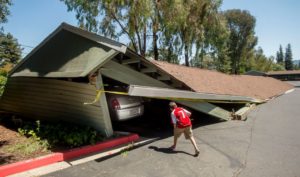Earthquake is a devastating natural event that when left uninsured can quickly lead to business or personal bankruptcy.
Loss or damage from earthquakes is excluded on standard business and residential property insurance policies. In the event of a serious earthquake loss, uninsured companies may lack the funds to service debt, pay taxes, rebuild their building, replace damaged personal property including stock and inventory, continue operations elsewhere during the repairs and often most importantly, continue to keep key personnel on the payroll.

Uninsured Homeowners may also lack the funds to rebuild, service debt and move the family into other housing during the repairs.
Business Earthquake Insurance can be purchased as an endorsement to an existing policy but more often is purchased as a separate policy. The premium is based on location (not surprisingly policyholders in the Western United States often pay premiums ten times as high as those in the Eastern United States), age of the buildings and types of structure with wood frame buildings being less expensive to insure for earthquake than brick and stone. Deductibles on Earthquake Insurance Policies can range from 5% to 25%.
Homeowners can insure their residences through the California Earthquake Authority (CEA). Coverage is provided for loss to the structure and personal property plus coverage for the expenses of living elsewhere during the repairs (Additional Living Expense).
Other Business Policies That Cover Earthquake Losses
Other insurance policies may cover earthquake losses without additional endorsement:
- Commercial Auto – Most standard commercial auto policies cover loss or damage from earthquakes if “comprehensive” coverage is included on policy. This can include damage from falling debris, fire, or other events.
- Workers’ Compensation – Injury to employees at work by earthquake effects is a covered loss under workers’ compensation insurance.
- Personal Auto Insurance – As with Commercial Auto coverage is provided if “comprehensive” coverage is included on policy.
The Dougherty Company would welcome the opportunity to provide you with an Earthquake Insurance proposal. Please contact Shirleen Reed, shirleen@doughertyins.com, (562) 424-1621.
(Sources for the article included the California Earthquake Authority)

